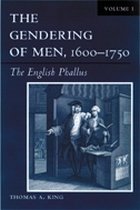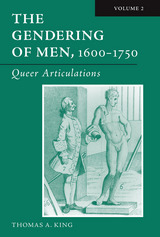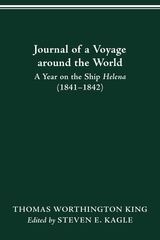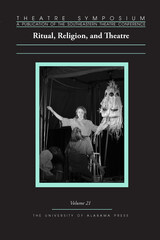
Taking on nothing less than the formation of modern genders and sexualities, Thomas A. King develops a history of the political and performative struggles that produced both normative and queer masculinities in the seventeenth and eighteenth centuries. The result is a major contribution to gender studies, gay studies, and theater and performance history.
The Gendering of Men, 1600–1750 traces the transition from a society based on alliance, which had subordinated all men, women, and boys to higher ranked males, to one founded in sexuality, through which men have embodied their claims to personal and political privacy. King proposes that the male body is a performative production marking men’s resistance to their subjection within patriarchy and sovereignty. Emphasizing that categories of gender must come under historical analysis, The Gendering of Men explores men’s particpation in an ongoing struggle for access to a universal manliness transcending other biological and social differentials.
This is volume one of two projected volumes.


In 1841 Thomas Worthington King accepted a position as supercargo on the Helena, a ship some have called “the first American clipper,” as it was about to make its maiden voyage to China. Journal of a Voyage around the World recounts the travel of Thomas Worthington King on the Helena from 1841 to 1842.
In full and well-written entries, King recounts the routines and surprises of life at sea, where storms and calms could be equally threatening, and the next day might bring a stop at St. Helena to see Napoleon’s tomb or an encounter with pirates. King provides details often missing from histories that give a real sense of the period. In his description of Chile and Peru we learn about activities as diverse as cockfighting and courtship. We learn about produce and prisons, mints and monasteries, fruits and fashions. In his account of China, King vividly describes rivers so full of boats that one could “see no water—nothing but the large mat sales” and calm groves of “green lychee, or broad leaved & rustling plantain.”
Perhaps the most important subject of the diary is the diarist himself, whose talent and confidence develop on the pages of his record. Thomas Worthington King was born and raised in Chillicothe, Ohio, and was the grandson of two Ohio Senators: Rufus King and Thomas Worthington.

Whether or not theatre arose from ritual and/or religion, from prehistory to the present there have been clear and vital connections among the three. Ritual, Religion, and Theatre, volume 21 of the annual journal Theatre Symposium, presents a series of essays that explore the intricate and vital relationships that exist, historically and today, between these various modes of expression and performance.
The essays in this volume discuss the stage presence of the spiritual meme; ritual performance and spirituality in The Living Theatre; theatricality, themes, and theology in James Weldon Johnson’s God’s Trombones; Jordan Harrison’s Act a Lady and the ritual of queerness; Gerpla and national identity in Iceland; confession in Hamlet and Measure for Measure; Christian liturgical drama; Muslim theatre and performance; cave rituals and the Brain’s Theatre; and other, more general issues.
Edited by E. Bert Wallace, this latest publication by the largest regional theatre organization in the United States collects the most current scholarship on theatre history and theory.
CONTRIBUTORS
Cohen Ambrose / David Callaghan / Gregory S. Carr
Matt DiCintio / William Doan / Tom F. Driver / Steve Earnest
Jennifer Flaherty / Charles A. Gillespie / Thomas L. King
Justin Kosec / Mark Pizzato / Kate Stratton

READERS
Browse our collection.
PUBLISHERS
See BiblioVault's publisher services.
STUDENT SERVICES
Files for college accessibility offices.
UChicago Accessibility Resources
home | accessibility | search | about | contact us
BiblioVault ® 2001 - 2024
The University of Chicago Press









